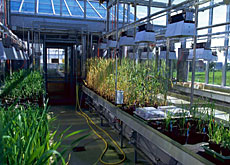GM lobby says crop ban would be fruitless

Supporters of genetically modified organisms - or GMOs - believe a proposed five-year moratorium on their use would do little to stop them spreading to Switzerland.
They claim the ban would also kill off GMO research and force major producers of modified crops abroad.
Both arguments form the core message of lobbyists working to block a proposed moratorium on the commercial use of GMOs.
With parliament set to decide on a raft of new laws – including a potential liability regime for any future damage caused by GMOs – all sides of the debate have been increasing their efforts to sway both Swiss politicians and the public.
Supporters of a moratorium on the commercial use of genetically modified crops argue that the move would have irreversible consequences.
They claim that once modified crops are introduced, they would cross-fertilise with organic varieties.
GMO safest “on earth”
But groups working to avoid a ban on GMOs – including the Swiss research group Internutrition, which is backed by agrochemical firms such as Syngenta – argue that modified crops pose no threat to “organic varieties” when used properly.
Arthur Einsele, head of public affairs at Syngenta, told swissinfo that public fears about genetically engineered produce needed to be taken seriously.
“But it has to be said that we are growing more than 50 million hectares of GMOs worldwide, mostly in the United States, Canada and some in Argentina and China, and so far not one single accident has appeared,” says Einsele.
“I would say [GMOs]… are the safest [products] on earth,” he says.
Switzerland no island
Big seed producers also argue that the notion of keeping Switzerland 100 per cent free of GMOs in order to justify the country’s “organically pure” status is fanciful.
Michael Teuber, professor of food microbiology at Zurich’s Institute of Technology, says the spread of modified genes to supposedly natural plants is already taking place and is unavoidable.
In biological terms, Teuber says all commercial crops have experienced varying levels of cross-fertilisation.
“This situation already exists now because we are surrounded by countries like France, Germany, Italy and Austria, where – at least at the experimental level – genetically modified plants have been, and can be, planted,” Teuber told swissinfo.
Teuber also points out that environmentalists’ concerns about the cross-fertilisation of native European plants are only true for a handful of crops, such as sugar beets and canola.
“For maize, corn or potato, there are no wild versions of these plants in [Europe]… so this fear of releasing genetically modified pollen into the wild does not exist,” he says.
Importance of research
The other source of concern for researchers and companies such as Syngenta is that the proposed ban could stifle research in Switzerland.
This issue came to a head in early September when the Swiss environment minister, Moritz Leuenberger, overturned a ban imposed by his own department on a proposed GMO trial at Zurich’s Federal Institute of Technology.
Leuenberger said he was forced to intervene in the case – involving some eight hectares of genetically altered wheat – because current laws do not make such research illegal.
Should parliament back a moratorium, however, such trials would become virtually impossible.
“We will lose our competency in GMO research,” says Einsele. “We have seen this in Europe where we have a defacto moratorium and research is going down.”
Teuber agrees, adding that without field trials GMO research is nothing but a lab-based discipline.
“To judge whether a plant is able to survive outside in harsh conditions, we need to experiment outside the greenhouse,” he explains.
“So the fear is, if we have a moratorium, scientists will not be able to do their experiments.”
Public distrust
Much of the GMO debate centres on whether Swiss consumers are prepared to trust scientists’ claims that modified produce is safe.
According to Teuber, GMOs “are as wholesome as traditional food”. “People can eat it without problems,” he says.
But Teuber concedes that the public remains distrustful of such claims.
“That is one of the problems. Scientists can say the risk is one-in-a-million, or one-in-ten-million. But to the lay person, that doesn’t matter, he doesn’t want to have the risk at all.”
“Scientists have to convince consumers that there is a high benefit and low risk.”
swissinfo, Jacob Greber

In compliance with the JTI standards
More: SWI swissinfo.ch certified by the Journalism Trust Initiative



You can find an overview of ongoing debates with our journalists here. Please join us!
If you want to start a conversation about a topic raised in this article or want to report factual errors, email us at english@swissinfo.ch.